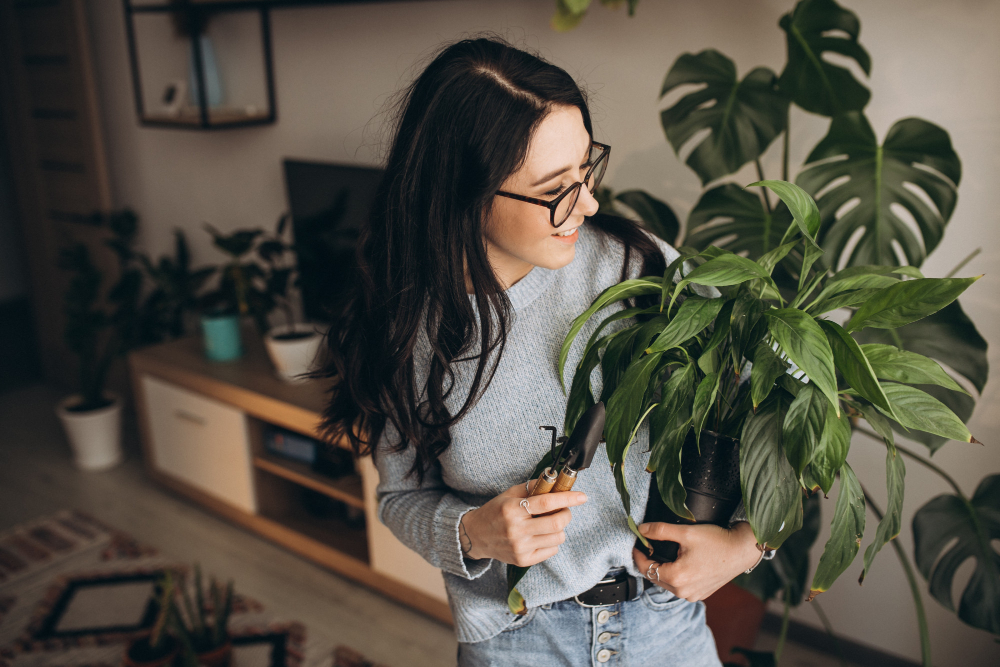
Growing Your Way To Better Mental Health: The Benefits Of Plants
Hey there folks, have you ever felt anxious or depressed? If you are feeling low or just need a boost in your emotional and mental health, why not turn to plants? Did you know that plants can cure anxiety and depression? Yes, that’s right! Plants have a way of calming our minds and healing our souls.
If you’re wondering how plants can cure anxiety and depression, let me explain. Plants have the power to release chemicals that affect our brain and nervous system, helping to reduce stress and anxiety levels. Studies have shown that being in nature and surrounded by greenery can help to reduce symptoms of depression and anxiety, improve mood, and boost overall well-being. There are huge benefits of plants for Mental Health.
The Relationship Between Plants and Mental Health
As we go through the hustle and bustle of daily life, we often forget to take care of our mental and emotional health. Stress, anxiety, and depression are some of the common problems we face in our day-to-day lives. Anxiety and depression are two major mental health disorders in the world. They can have a profound effect on our quality of life, making it difficult to enjoy even the simplest things.
However, nature has the power to heal and rejuvenate us. Plants not only enhance the beauty of our surroundings but also have a positive impact on our mental and emotional well-being. They improve the quality of the air we breathe, help reduce stress levels, and can even boost our mood. Plants can help purify the air in your living space by absorbing toxins, such as carbon dioxide and formaldehyde, and releasing oxygen, which can help to improve air quality. This can be especially helpful for people who suffer from allergies or asthma. They are also natural and non-toxic, making them safe for both people and pets. If you are looking for a way to improve your mental health, consider planting an anxiety-free zone in your home!
Not only will this improve your mental health, but it will also help reduce anxiety, depression, and stress. In addition, it will create a clean and nature-friendly environment in your home. So, if you’re looking for a way to improve your quality of life, then this is it!
How Can You Create an Anxiety-Free Zone in Your Home?
It’s no secret that humans are causing some serious damage to the planet. And while we might not be able to immediately fix the larger problem, there are small things we can do that will have a positive impact. . One of those things is planting an anxiety-free zone in your home.
Creating an anxiety-free zone in your home has several benefits. Firstly, it can lower stress and anxiety levels. Simply having plants in your home can create a calming atmosphere that helps you relax and unwind. Secondly, plants improve air quality by producing oxygen and filtering out harmful toxins. Lastly, plants can bring joy into your home through their vibrant colors, textures, and fragrances, acting as a natural mood booster.
To create an anxiety-free zone, follow these simple steps. Choose plants that are suitable for your space based on their size, light requirements, and other factors. Make sure your environment is inviting and clutter-free to further reduce stress levels. Ensure that each plant gets the right amount of sunlight by finding the perfect spot for them. Once you have bought the plants, set them up in their designated locations and commit to regular maintenance. Finally, take time each day to enjoy and appreciate the natural beauty and benefits of your plants.
The Science Behind the Benefits of Plants for Mental Health
While traditional treatment methods, such as medication and therapy are effective in treating some mental health issues like anxiety and depression, they are not always suitable for everyone. Fortunately, nature has provided us with some remedies that can help alleviate these symptoms. One of these remedies is plants.
The use of plants for treating mental health issues has a long history, dating back thousands of years. In recent years, there has been increasing scientific interest in the therapeutic properties of plants for treating a range of mental health conditions, including anxiety, depression, and post-traumatic stress disorder (PTSD).
Reducing Stress and Anxiety
Studies have shown that spending time in nature and around plants can help to reduce stress and anxiety levels. Plants release chemicals called phytoncides, which can help to lower cortisol levels and reduce feelings of anxiety. In addition, the act of caring for plants and gardening can be a calming and meditative activity that promotes relaxation.
Improving mood
Research has shown that certain plants, like lavender and chamomile, possess mood-enhancing properties. Lavender, for instance, can reduce symptoms of anxiety and depression by creating a calming effect. Chamomile can also improve mood and reduce stress due to its anti-inflammatory and antioxidant properties.
Boosting Cognitive Function
Plants can also help to improve cognitive function and memory. Research has shown that indoor plants can improve air quality and increase oxygen levels, which can help to boost brain function. In addition, the act of caring for plants can help to improve focus and concentration, which can be beneficial for individuals with attention deficit disorders.
Increasing Social Connection
Plants can also help to promote social connections and reduce feelings of loneliness. Community gardening programs, for example, can provide opportunities for individuals to connect with others and develop a sense of belonging.
The use of plants for mental health treatment is known as Phytotherapy, which involves using natural plant extracts for therapeutic purposes. Plants contain a variety of bioactive compounds, including alkaloids, flavonoids, terpenes, and phenolic acids, which have been found to possess therapeutic properties. These compounds can interact with the brain’s receptors and alter the levels of neurotransmitters such as serotonin, dopamine, and norepinephrine, which are known to play a crucial role in regulating mood, anxiety, and stress.
Tips to Get Started with Plant Therapy
At the end of a long day, what do you want to come home to? A place that is welcoming, cozy, and relaxing. For many people, their home is not just a place to live, but their sanctuary. Now imagine if that place could also help you destress, lower your anxiety, and ease your depression. It might sound too good to be true, but that’s exactly what plants can do.
In this article, we will explore the benefits of plants to boost our Mental Health and also provide a few tips to pick out the best ones that you should consider adding to your home.
Lavender
One of the best plants to help with anxiety and depression is lavender. Lavender has been used for centuries as a natural remedy for anxiety and stress.
Lavender is a well-known plant that is commonly used in aromatherapy. It has a calming effect and is believed to help reduce anxiety and depression. Several studies have shown that lavender essential oil can help reduce anxiety levels, promote relaxation, and improve sleep quality. You can place a potted lavender plant in your bedroom or use its essential oil in a diffuser to enjoy its soothing effects. Its soothing scent can help to calm nerves and promote relaxation, making it an excellent plant to keep in your home or garden.
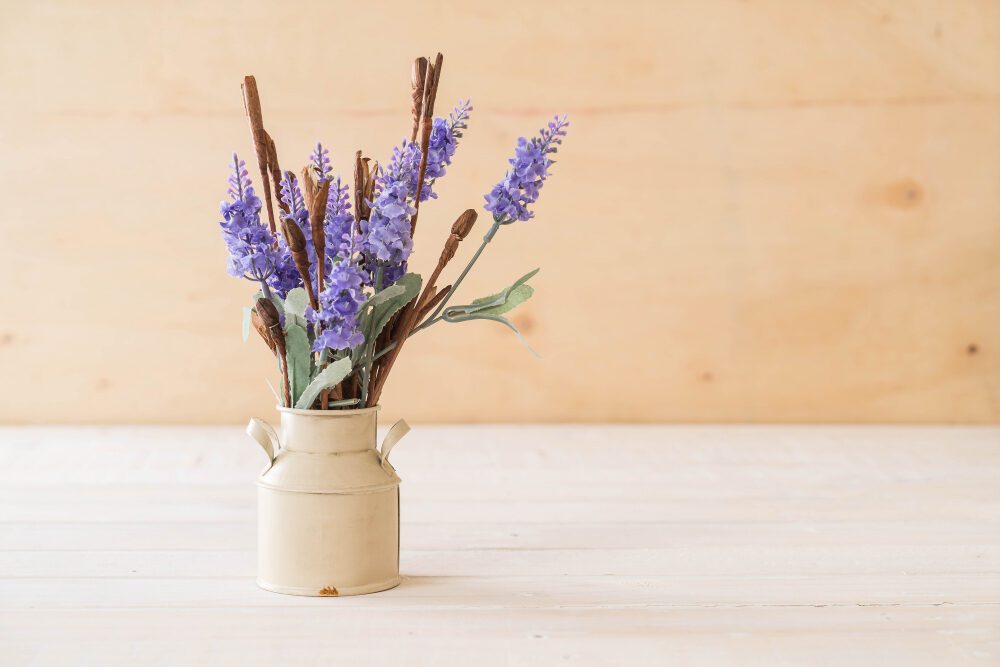
How to Care
To care for Lavender plants, water deeply once a week, avoid overwatering to prevent root rot, use well-draining soil with a slightly alkaline pH level between 7 and 8, ensure at least six hours of sunlight per day, and fertilize once a year in the spring using low-nitrogen, phosphorus-rich fertilizer.
Ideal Location
For optimal growth, place lavender plants in a south-facing window or a spot with at least 6 hours of sunlight daily. Keep the temperature between 60°F to 80°F and avoid cold air and drafts. Since lavender prefers low humidity, avoid placing it in high humidity areas like the kitchen or bathroom. Good airflow is essential, so place it in well-ventilated areas. Lavender plants are aesthetically pleasing and create a calming atmosphere, making them ideal for the bedroom, living room, or home office.
Chamomile
Chamomile is another plant that has been used for centuries to promote relaxation and reduce anxiety. It is commonly consumed as a tea, and research has shown that it can help reduce symptoms of anxiety and depression. Chamomile contains compounds that have a calming effect on the nervous system and can help reduce stress and anxiety levels. Chamomile is a natural sedative that can help to calm the mind and reduce stress levels. It’s also great for promoting relaxation and helping you get a good night’s sleep.
How to Care
To grow healthy chamomile plants, water them regularly without overwatering to prevent root rot. Use well-drained soil rich in organic matter, mixing in compost before planting. Provide at least six hours of direct sunlight per day or partial shade. Use balanced fertilizer lightly once a month during the growing season for optimal growth.
Ideal Location
To grow chamomile plants, you need at least six hours of direct sunlight daily. You can place them in a sunny window or a sunroom. Alternatively, you can grow them in containers on a balcony or patio that gets plenty of sunlight. They pair well with other herbs in a herb garden. Chamomile plants can also be grown in the kitchen and used to make tea and other herbal remedies. Place them near a sunny window and use them as needed.
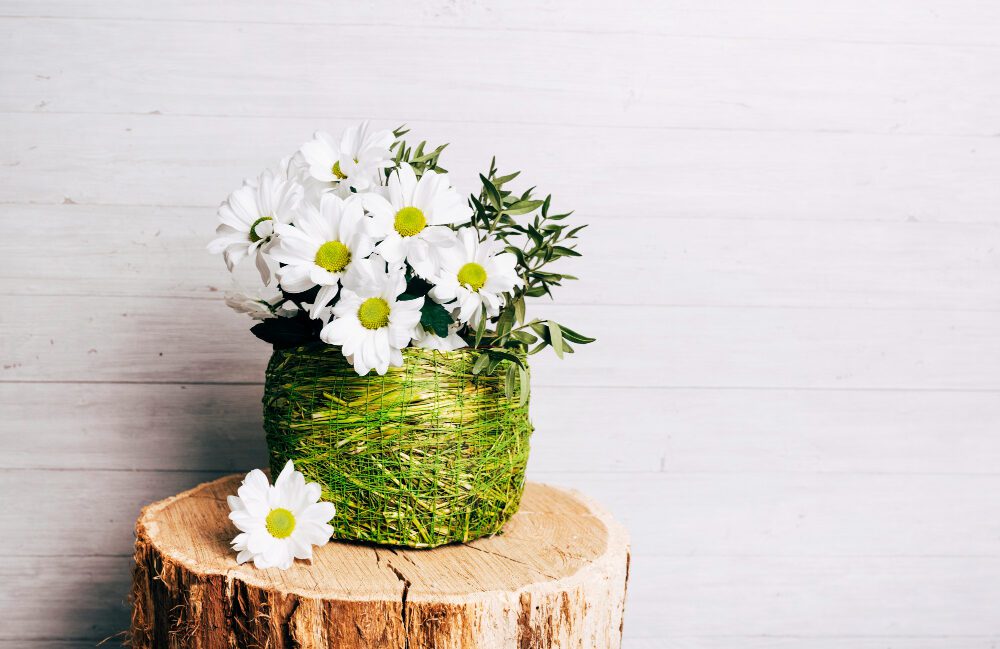
Valerian Root
Valerian root is a plant that is commonly used as a natural remedy for anxiety and insomnia. It has a sedative effect and can help promote relaxation and calmness. Valerian root contains compounds that increase the levels of GABA, a neurotransmitter that helps regulate mood and reduce anxiety.
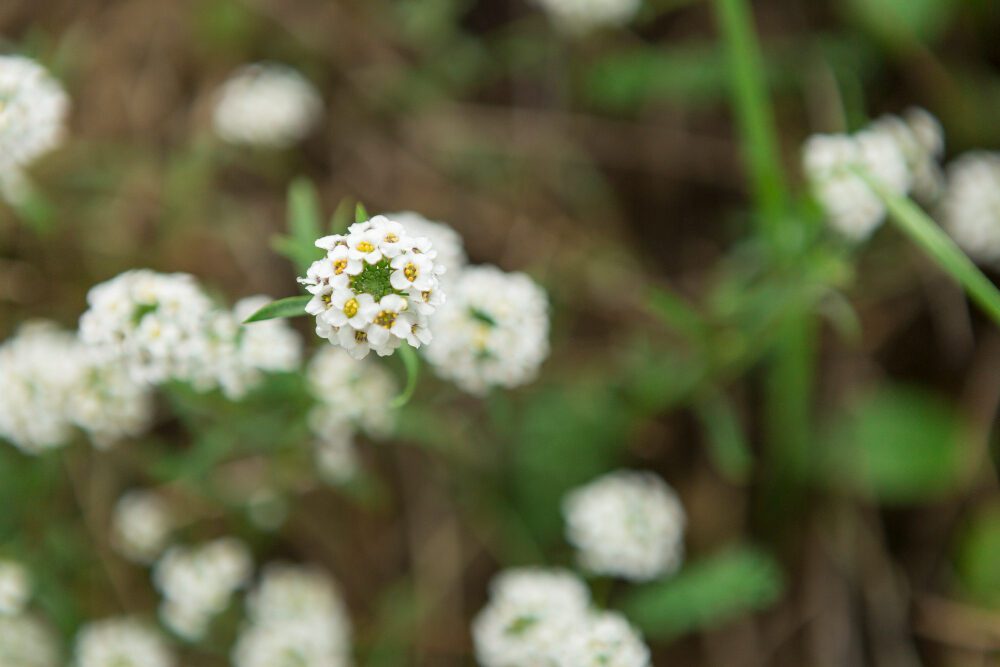
How to Care
To grow Valerian Root, plant it in well-draining, organic-rich soil. Keep the soil moist but not waterlogged and cool with a layer of mulch. Fertilize monthly with balanced fertilizer during the growing season. Prevent fungal diseases by avoiding water on leaves and ensuring good air circulation.
Ideal Location
To grow healthy Valerian Root, choose a cool, moist location with partial shade and enough vertical space. Avoid high-traffic areas and direct sunlight. For ventilation, place near a window or door that can be opened to prevent fungal diseases.
St. John’s Wort
St. John’s Wort is a plant that is commonly used as a natural remedy for depression. It contains compounds that help regulate mood and reduce symptoms of depression. Several studies have shown that St. John’s Wort can be as effective as some antidepressant medications, making it an excellent natural alternative for those who do not wish to take medication.
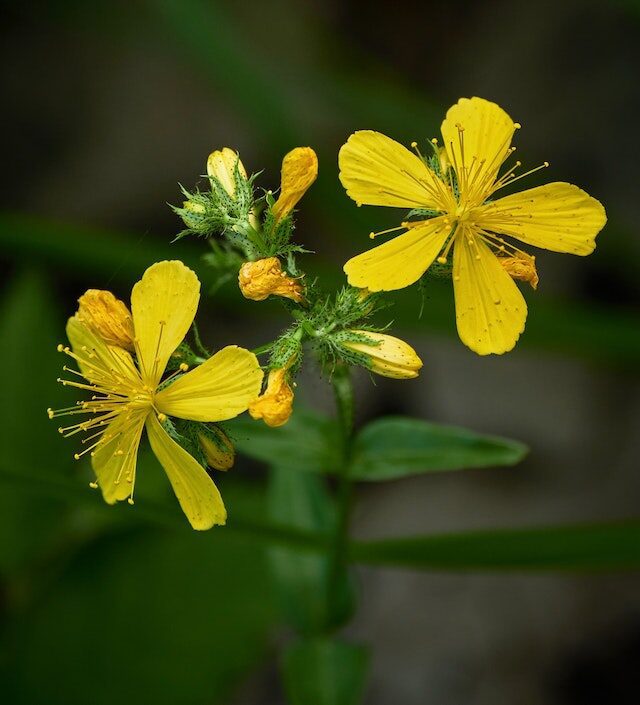
How to Care
St. John’s Wort thrives in full sun and well-draining soil with rich organic matter. Water it regularly, but avoid overwatering. Watch for pests and diseases, and promptly address any issues. Fertilize once or twice a year with balanced fertilizer for optimal growth and bloom.
Ideal Location
St. John’s Wort is best grown outdoors in full sun. However, if you want to grow it indoors, place it in a sunny south-facing window with at least 6 hours of direct sunlight per day. Ensure the room is well-ventilated to prevent pest and disease problems, and avoid drafty areas as the plant doesn’t tolerate cold temperatures. For harsh winters, use grow lights to supplement light for indoor growth.
Aloe Vera
Aloe Vera is a low-maintenance plant that has been used for centuries for its healing properties. It is a great plant to have around as it’s easy to care for and offers a range of benefits. It’s known to improve air quality, reduce stress and anxiety, and promote better sleep. Apart from all these benefits, it’s one of the best go-to plants if you are caring for your skin and hair.
How to Care
To care for your Aloe Vera plant, water sparingly and allow the soil to dry out between waterings. Provide bright, indirect light but avoid direct sunlight which can damage the leaves. Use a well-drained pot to prevent root rot. Fertilize sparingly, only a few times per year to avoid harming the plant.
Ideal Location
Aloe Vera plants thrive in bright, indirect light, and warm temperatures. If you have a south-facing window, that’s the ideal spot, but any sunny window or warm room will do. Good air circulation is important, so choose a well-ventilated room. If you lack a windowsill, place your Aloe Vera on a sturdy table or shelf near a window. Avoid drafty areas.
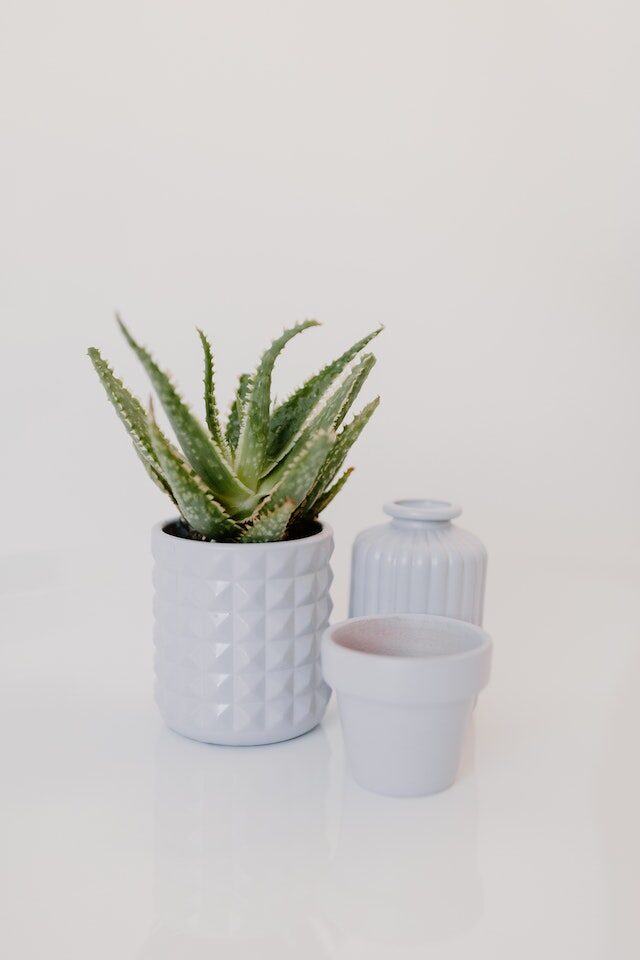
Passionflower
Passionflower is a plant that is commonly used as a natural remedy for anxiety and insomnia. It contains compounds that have a calming effect on the nervous system, making it an excellent natural remedy for anxiety and depression. Several studies have shown that passionflower can help reduce symptoms of anxiety and improve sleep quality.
How to Care
Passionflower plants need bright, indirect light, and well-drained soil rich in organic matter. Water regularly, keeping soil moist but not waterlogged. Ideal temperatures range between 65-80°F (18-27°C), and humidity levels should be high. Fertilize monthly during spring and summer with balanced fertilizer. Avoid direct sunlight for long periods and frost exposure. Consider using a humidifier or tray of water nearby to increase humidity.
Ideal Location
For optimal growth, place your Passionflower plant in a bright, sunny spot with indirect light, away from drafts or air conditioning. Keep the air moist by placing it near a humidifier or in a bathroom. Give the plant enough space to spread out or climb on supports. The intricate flowers of Passionflower plants can enhance the décor of any room when placed in a decorative pot or planter.
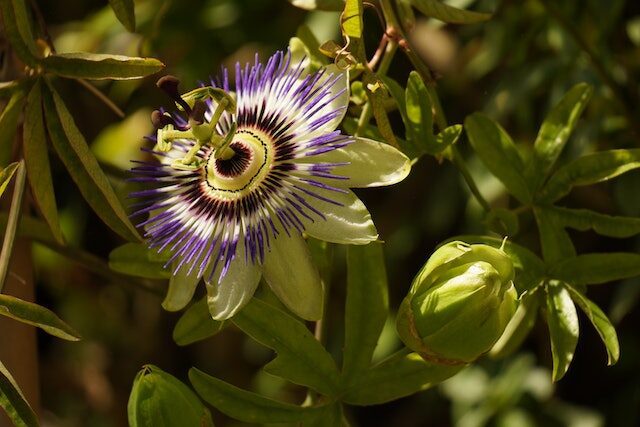
Snake Plant
Snake Plant, also known as mother-in-law’s tongue, is another plant that is great for improving air quality. It has the ability to remove toxins such as formaldehyde and benzene from the air. There are numerous benefits of Snake Plants for Mental Health.
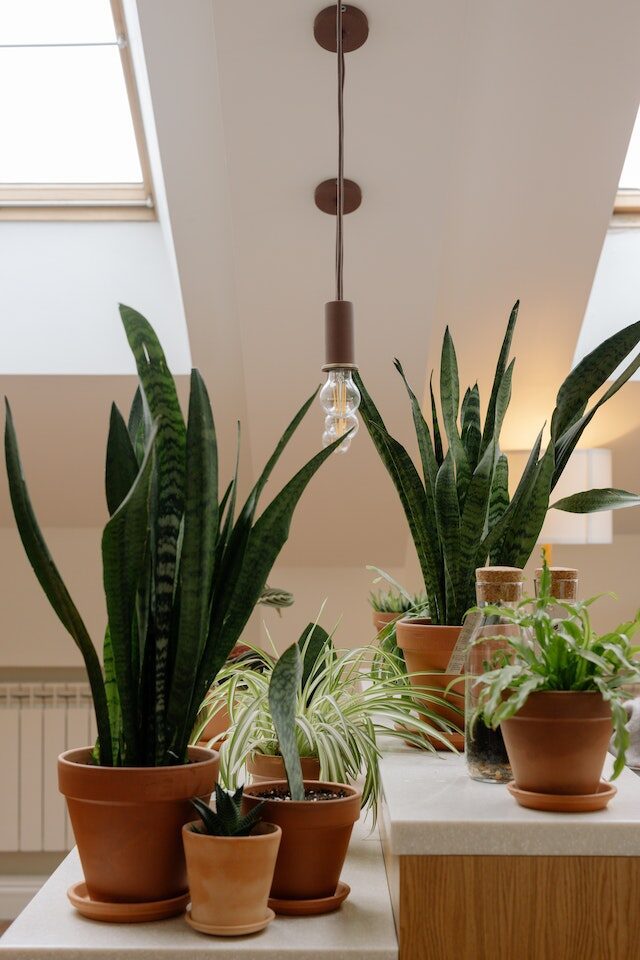
How to Care
Snake plants prefer dry soil, can handle low to bright indirect light, and temperatures between 60-85°F (15-29°C). Use well-drained soil, such as cactus or succulent mix. Avoid overwatering to prevent root rot. Fertilize with balanced liquid fertilizer monthly during the growing season. Direct sunlight can scorch the leaves.
Ideal Location
Snake plants are versatile houseplants that can thrive in low to bright indirect light and tolerate low humidity levels, making them a good choice for bedrooms, bathrooms, and dry environments. They grow up to several feet tall but are narrow and compact, making them ideal for corners or small spaces. With a modern and minimalist look, they complement contemporary or Scandinavian-style décor and can be paired with natural baskets or pots for a bohemian or natural aesthetic.
Rosemary Plant
Rosemary is a herbal plant that has memory-enhancing properties. It can also help to improve concentration and reduce stress.
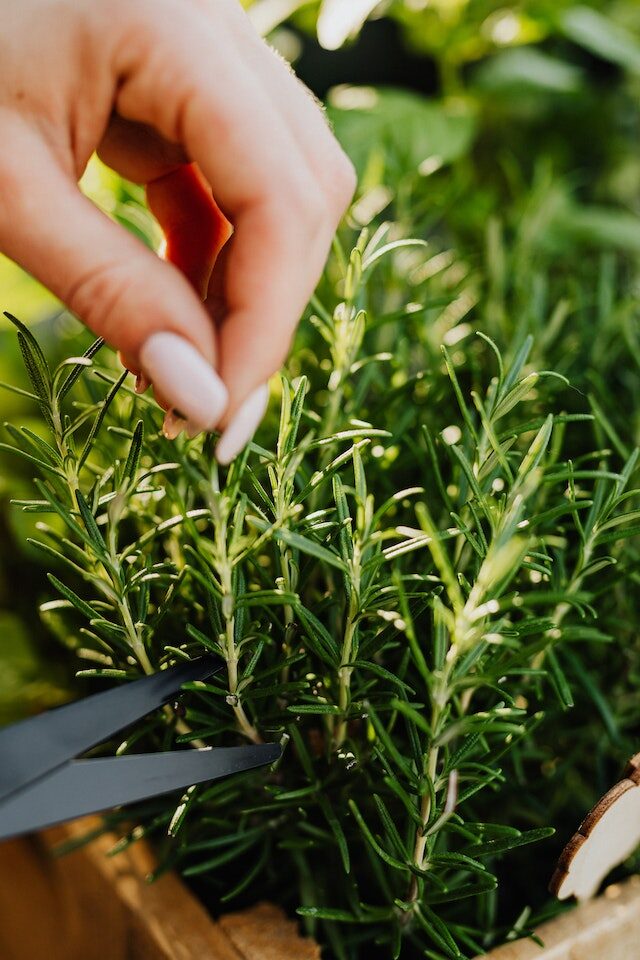
How to Care
Rosemary needs well-drained soil and should only be watered when the soil is dry to the touch, but not left to dry out completely. It needs at least 6 hours of direct sunlight daily, and prefers cooler temperatures between 60-75°F (16-24°C). A light monthly application of organic fertilizer can help promote growth, but it doesn’t need much fertilizer overall.
Ideal Location
Rosemary is a popular cooking herb, and placing it in the kitchen is convenient. It needs direct sunlight, so place it near a sunny window or outside in a sunny spot if possible. It also enjoys humidity, so the bathroom is a good option. Rosemary can be a decorative plant in the living room if placed near a bright spot.
Spider Plant
Spider Plant is another plant that is great for purifying the air. It is easy to care for and can help to remove harmful chemicals such as benzene and formaldehyde from the air.
There are almost 200 species of spider plants, and many of them may survive our little negligence.
How to Care
Spider plants are a low-maintenance and popular choice for indoor plants. To care for your spider plant, keep it in bright, filtered light, and water it when the top inch of soil is dry. Maintain moderate to high humidity and temperatures between 60 and 75 degrees Fahrenheit. Use well-drained soil with perlite or vermiculite and fertilize once a month during the growing season. Repot every two to three years in a slightly larger pot. Avoid direct sunlight and overwatering to prevent leaf scorching and root rot.
Ideal Location
Spider plants can thrive in a variety of locations within a home, but the ideal location would be a spot that receives bright, indirect light. A spot near an east-facing window or a few feet away from a south- or west-facing window would work well. Avoid placing your spider plant in direct sunlight or in a location that receives no light. Also, make sure the location is not too cold or too hot, and has moderate to high humidity. A well-ventilated area is also ideal for spider plants.
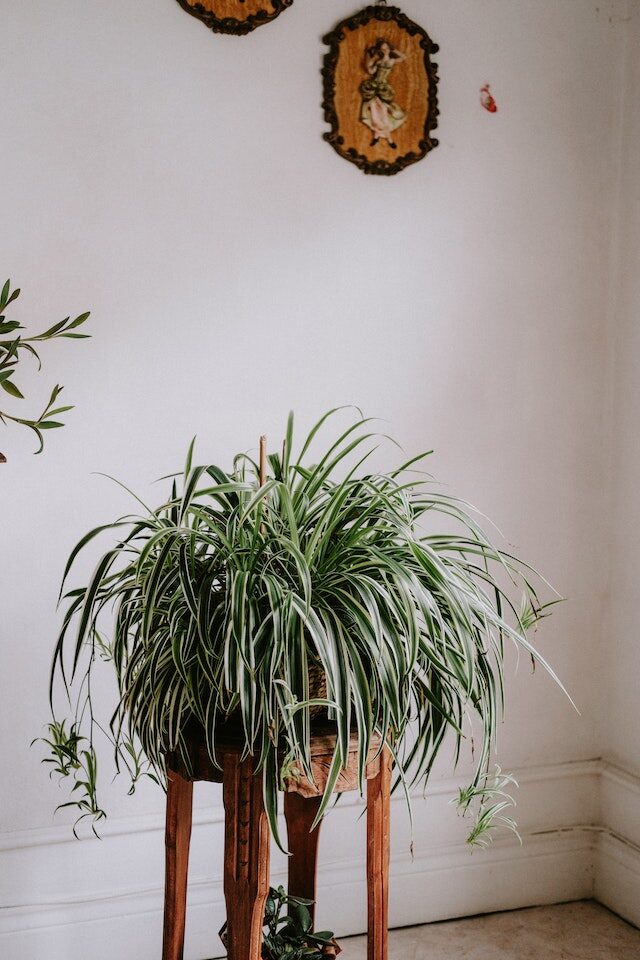
Jasmine
Jasmine is a fragrant plant that has a calming effect on the mind. Its sweet scent can help to reduce anxiety and promote relaxation. Jasmine is another plant that can help with anxiety and depression. Its sweet scent has a calming effect on the nervous system, helping to reduce anxiety and promote relaxation. It’s also great for helping to improve mood and reduce symptoms of depression.
How to Care
Jasmine needs consistent moisture, so water when the top inch of soil dries out. Provide bright, indirect light and avoid direct sunlight that can burn leaves. Keep it in a humid environment, mist or use a humidifier. Fertilize every two weeks in spring and summer, and once a month in fall and winter using a balanced fertilizer. Avoid overwatering and root rot.
Ideal Location
Jasmine needs bright, indirect light near a window. Keep it away from direct sunlight and extreme temperatures. High humidity is preferred, so place it in a bathroom or kitchen, or use a humidifier. Allow space for growth up to 6 feet in height and width. Enjoy the strong, sweet fragrance by placing it in a room where it can be appreciated, like a bedroom or living room.
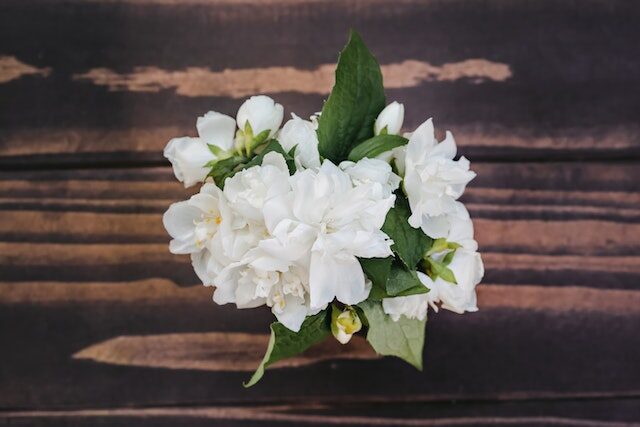
Peppermint
Peppermint is a herb that reduces stress and promotes mental clarity. It is also great for digestion and can help to relieve headaches.
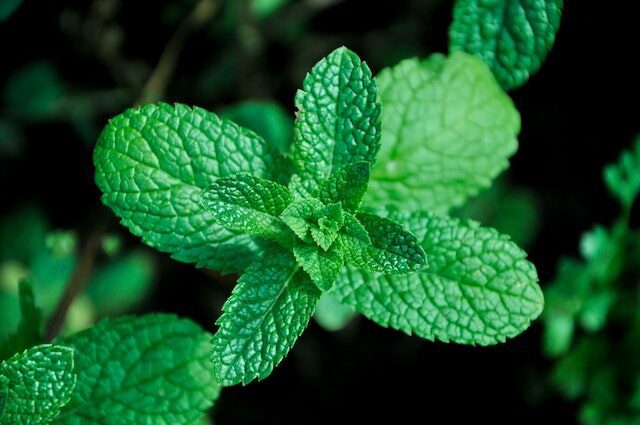
How to Care
For optimal growth of peppermint, keep the soil consistently moist, but not waterlogged. Water deeply once or twice a week. It thrives in partial to full sun. Use balanced fertilizer once or twice a year. It’s generally resistant to pests and diseases, but watch for spider mites, aphids, and whiteflies.
Ideal Location
Peppermint is a versatile herb that can enhance the ambiance of different rooms in your home. Its fresh scent makes it ideal for the kitchen, where you can place it on a windowsill or countertop. In the living room, put it in a decorative pot on a coffee table or shelf. For the bathroom, place it on a windowsill or bathtub edge to enjoy its invigorating aroma. In the bedroom, put it on a nightstand or dresser to help promote relaxation and sleep.
From Garden to Mind: How Plants are Proving to be the Ultimate Healers for Mental Health!
To wrap up, the idea that plants can cure anxiety and depression has gained increasing attention in recent years, and there is mounting scientific evidence to support this claim. Many plants contain natural compounds such as chamomile, lavender, and St. John’s Wort that researchers have shown to calm the mind and body. reduce stress and anxiety levels, and improve overall mood.
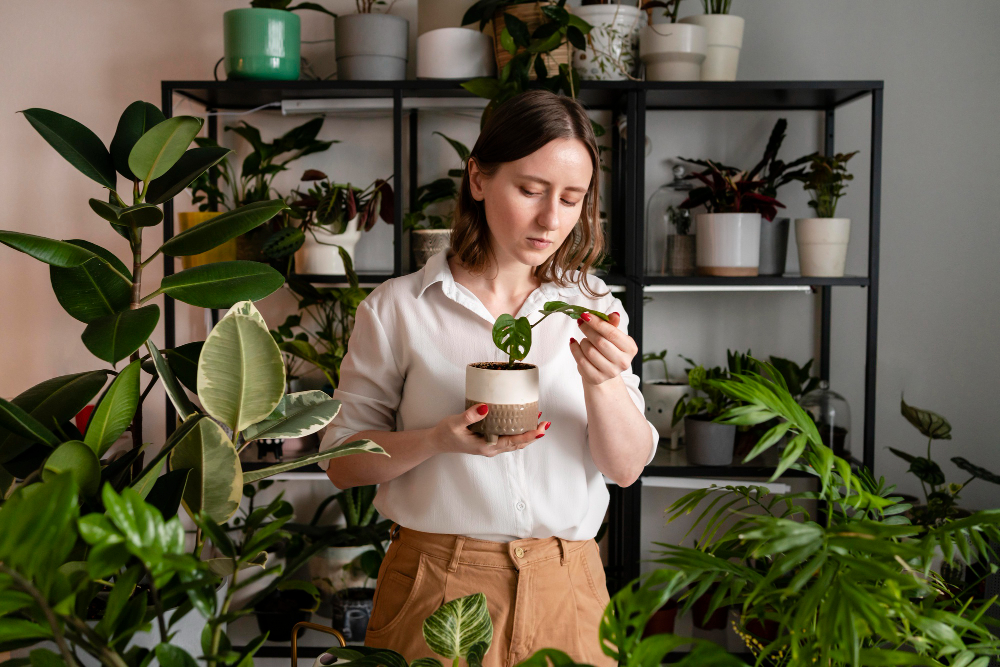
While plant-based remedies may not be a substitute for medical treatment, they can be a valuable complement to traditional therapies, providing a natural and holistic approach to mental health. Additionally, incorporating plants into our daily lives can have a range of other benefits, from improving air quality to promoting mindfulness and relaxation.
As the world becomes more aware of the potential of plants to heal, we can expect to see increased research and development in this area, as well as a growing interest in incorporating plant-based remedies into our healthcare regimens. Ultimately, plants offer a promising avenue for treating anxiety and depression, and their benefits extend far beyond mental health, making them a valuable addition to any wellness routine.
So why not add some greenery to your space today and reap the benefits? 💚


Very informative and detailed article